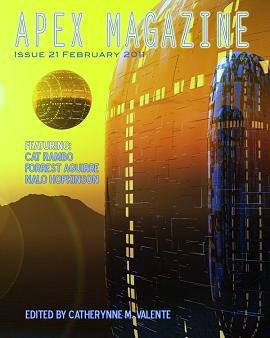 Apex Magazine #21, February 2011
Apex Magazine #21, February 2011
“Close Your Eyes” by Cat Rambo
“Langknech and Tzi-Tzi in the Land of the Mad” by Forrest Aguirre
“A Raggy Dog, a Shaggy Dog” by Nalo Hopkinson (reprint)
Reviewed by Caroline E. Willis
“Close Your Eyes” by Cat Rambo is an urban fantasy about a woman and the suspicious behavior of her angry, dying brother. The woman is an artist and a storyteller, and as such, starts to become aware of the strange things happening to her as functions of a plot. Rambo tells the story recursively, using alternate beginnings and endings to create a splintered reality, much like what the characters themselves experience. And like the characters, the reader is given the option of choosing their own path.
The highlight of this story is the complexity of the brother-sister relationship. I think, perhaps, that the recursive style of the story is a reflection of this complexity, a narrative demonstration of how something can be two different things at the same time: how a brother can both love and hate his sister with all his being.
“Langknech and Tzi-Tzi in the Land of the Mad” by Forrest Aguirre tells the final fate of the creatures who live in the land of the mad. It explores the question of what happens to those creatures when the mad decide that they want to become sane.
Aguirre’s story starts out childlike in its imagery; Langknech, for example, is a stuffed giraffe. But the plot progresses slowly deeper, revealing the surreal horror beneath the storybook veneer. It turns out that the playthings of the mad have desires of their own, not least of which is their own survival, which puts them at odds with their creator. The unique setting is the main draw of this story; as is true for most horror, it’s all about the atmosphere.
“A Raggy Dog, a Shaggy Dog” by Nalo Hopkinson is a reprint of a story that first appeared in Lust for Life: Tales of Lust and Love, and thus is not reviewed here.